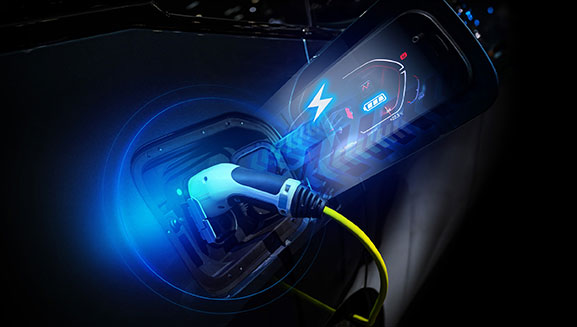Volume 27 | Issue 4
Click here to read the complete illustrated article or continue below to read the text article.
By Stella Ioannidou
Despite its significance to the global economy, the automotive industry faces mounting pressure to transition toward greener alternatives, particularly electric vehicles (EVs). Governments worldwide are implementing stringent regulations to reduce carbon emissions, with a growing focus on zero-emission transportation. In the United States, for example, the Federal Government has set ambitious targets, mandating that at least 50% of all new American vehicles sold by 2030 be zero-emission.
The shift to EVs and other innovations, such as autonomous driving solutions, demands new technologies and approaches, but also a new operating model where cars reach consumers directly rather than through dealerships. However, as our latest research has uncovered, a critical challenge remains: most automotive manufacturers lack the specialized talent they need to quickly adapt to these changes.
Our recent study of the automotive manufacturing industry’s current state, researched in collaboration with Eightfold, reveals a pressing issue: most manufacturers are grappling with a significant talent gap. The skills required for this transformation—ranging from electric drivetrain engineering to advanced machine learning—are in short supply. As a result, many players in the industry are struggling to cross the finish line in their race toward EV innovation.
Automotive manufacturers must recognize that relying solely on new STEM apprentices or experienced automative workers isn’t enough to navigate the mandates of the EV transition. To truly succeed, they must shift toward delivering not just high-quality EVs but also digitally enhanced driving experiences—essentially “computers on wheels.” This demands advanced capabilities in areas like software engineering, AI, and data science, which are essential for integrating advanced digital features and autonomous driving.
The research shows that automotive manufacturers need to urgently invest in building a workforce equipped not only for traditional “metal-bashing” production lines but also for emerging business models such as automated manufacturing, innovative product development, and direct-to-consumer sales. Companies that previously focused on conventional components like motors, interiors, drivetrains, and exhaust systems are now finding themselves ill-prepared to staff for radically different roles. These new roles increasingly require IT and software expertise, skills that are also highly sought after in other tech-driven industries.
Still, the analysis of the skills landscape in automotive manufacturing reveals a critical shortfall in next-generation expertise. While the sector is well-stocked with talent proficient in declining technology skills such as Java and SQL, there is a glaring deficit in the skills that will drive the future of the industry—machine learning, robotics, and data science. These are the capabilities needed to deliver the high-end driving experiences and on-demand, digitally enhanced vehicle-buying options that consumers of the late 2020s will increasingly expect.
This skills gap significantly hinders the sector’s ability to innovate and limits key players’ ability to remain competitive in the years ahead. Without the necessary expertise in areas like machine learning, robotics, and data science, the industry will struggle to deliver the advanced, digitally-driven experiences that the future of transportation demands.
To overcome this barrier and ensure they are equipped with the right talent to meet future challenges, automotive manufacturers must invest in what we term “systemic HR”: thinking of the entire array of HR approaches rather than trying to “hire their way out of this challenge.” We have identified the following strategies:
Automotive manufacturers lag behind other industries in HR maturity, with significant opportunities for improvement in understanding and applying the latest thinking and strategies around skills-based recruiting, retaining key talent, reskilling for the skills of the future, and redesigning work to automate and simplify the production line as much as possible.

Leading automotive manufacturers excel by strategically prioritizing roles that drive technology, transformation, and operational excellence. For instance, they have 23.2 times more quality experts and 4.9 times more software engineers than the industry average. By increasing roles like product specialists and technical project managers, companies can better manage complex projects and support the continuous improvement needed for the transition to electric vehicles (EV).
Pacesetter automotive companies employ three times more people with emerging technology skills compared to the industry as a whole. Key skills include .NET, Angular, AI, and robotics, essential for advancing vehicle tech and automation. Notably, pacesetters also have 3.1 times more employees with EV-specific expertise, such as electrical troubleshooting, safety management systems, and rapid prototyping. To achieve this, focus on creating future-oriented roles and building a talent mix with these critical skills.
In 2022, 1,022 U.S. schools produced graduates with degrees relevant to automotive engineering, with the majority from mechanical engineering programs. Leading institutions like Purdue, Georgia Tech, and Texas A&M are key sources of this talent. EV-focused companies can enhance recruitment by partnering with top universities, particularly those with strong master’s and doctoral programs for advanced STEM talent. This approach to university partnerships, which prioritizes upskilling potential over immediate readiness, broadens the candidate pool and attracts top talent aligned with the industry’s evolving goals.
By leveraging what we call “adjacent skills,” automotive manufacturers can create more efficient and targeted recruitment and talent development plans. For example, employees with Jenkins, DevOps, or data science expertise can more easily acquire skills in Docker, machine learning, and AI, because they are highly relevant and therefore upskilling will be faster compared to other skilling plans. Identifying these skill relationships allows manufacturers to promote from within and develop robust L&D programs, helping employees transition from declining skills to those in demand. AI-powered talent intelligence platforms can further optimize this by analyzing workforce data at scale and recommending personalized upskilling paths.
The market landscape is so dynamic that relying on gut feeling decisions around talent is risky. Understanding the capability landscape both within and outside of the organization and leveraging AI to map skills (what we call “talent intelligence”) can help manufacturers go beyond the narrow focus of job roles, making it easier to map potential career transitions across the organization. For example, the shift to direct-to-consumer sales in the automotive industry is rendering traditional, in-person sales models obsolete. Instead of relying on showroom interactions, sales associates can be transitioned into marketing specialists or inside sales advisors, based on skill adjacencies.
The message is clear: there’s work ahead, but if you start now, you can truly reach a more sustainable skill-enabled transport future—keeping your brand attractive and relevant.
And it’s not just car makers who should be concerned about this. Valued at an estimated $3 trillion, the global automotive industry stands as one of the most economic drivers of the global economy. Securing a good future for this sector helps us all.

STELLA IOANNIDOU
The author is an industry analyst and Senior Research Director at human capital advisory firm The Josh Bersin Company that provides insights on work, talent, learning, leadership, and HR technology. You can read the full report, Automotive Manufacturing: Navigating the EV Metamorphosis, here.
Scott Ellyson, CEO of East West Manufacturing, brings decades of global manufacturing and supply chain leadership to the conversation. In this episode, he shares practical insights on scaling operations, navigating complexity, and building resilient manufacturing networks in an increasingly connected world.